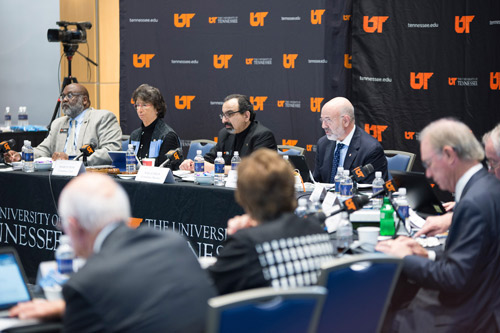Milestones

Self-Limiting Tuition Increases Makes History
For the third straight year, the University held tuition increases to an historic low, achieving a first in the history of the UT system.
A 1.8 percent undergraduate tuition increase for the academic year 2017-2018 is the lowest since 1984 and marked three consecutive years of increases at or below 3 percent—a first since the UT system was established in 1968. In 2016, tuition increased 2.2 percent and 3 percent in 2015.
The majority of fees did not increase and, of those for which UT Trustees approved a change, the net increase at each campus ranged from 0 percent to less than 3 percent.
The Tennessee Higher Education Commission set its first binding tuition recommendations in 2016-2017, and the University’s increase was well below that.
“Critical in our refusal to rely on tuition increases to close our funding gap is our commitment to self-limiting increases while working to maximize every dollar—regardless of its source—so that we maintain excellence in every function of the University, including stewardship of resources,” UT President Joe DiPietro said.
“Sustainable funding is our responsibility, and our goal is to achieve it while keeping college tuition affordable for all Tennesseans.”
That goal was aided substantially by unanticipated increases in state funding for the most recent three fiscal years, what DiPietro describes as a partnership to deliver future opportunity through higher education.
“Together, we are stronger,” he said. “Together, we’re making Tennessee stronger. I continue to be proud of our efforts to be a national leader in a proactive approach to hold down tuition increases.”
DiPietro said 44 percent of UT undergraduates finish with a bachelor’s degree and without debt. For those who graduate with debt, the amount is around $24,000, on average. But those with a college degree have an average seven-figure increased lifetime earning potential.
“A UT education remains a very wise investment,” he said.
Rebuilding the Business Model
In 2014, the University’s financial outlook—marked by a substantial projected funding gap resulting from decreasing funds and steady costs—prompted UT President Joe DiPietro to declare the business model not only unsustainable, but broken. DiPietro was determined to find a solution to the problem and one that did not rely on tuition increases to close funding gaps.
He brought together voices from inside and outside the University to form his Budget Advisory Group. DiPietro charged the group with thoroughly reviewing University revenues and expenditures toward closing the funding gap through greater efficiency and effectiveness, all while maintaining UT excellence.
The group developed a two-year set of fiscal restraints approved by the UT Board of Trustees and implemented on July 1, 2015. These self-imposed budget boundaries were to increase revenue, cut costs, establish spending parameters, enhance internal controls and set goals for campuses to better address short- and long-term priorities for reallocating new revenue and cost savings.
In January 2017, a few months before the end of the two-year period governed by the budget boundaries, DiPietro reconvened the group to evaluate the approach and set goals for another two fiscal years. The group also articulated a set of underlying principles for maximizing resources and fiscal effectiveness. The president’s Budget Advisory Group will be an ongoing resource for ensuring prudent use and maximization of resources.
Achievements
Affordability
Three consecutive years of undergraduate tuition increases of 3 percent or lower. UT Chattanooga and UT Martin reduced regional out-of-state tuition to enhance competitiveness.Complete College Tennessee Act Performance Funding Model
UT institutions are continually within the top five performing universities for CCTA metrics.Development
Total number of gifts, pledges and bequests system-wide grew more than 15 percent a year based on a five-year average.Efficiencies and Cost Savings
Budget re-balancing process at UT Chattanooga to re-allocate 5 percent of budgeted funds. Voluntary retirement incentives at UT Chattanooga, UT Martin and the Institute of Agriculture that achieved more than $9 million in combined savings.Enrollment
Out-of-state enrollment increased on all campuses. Out-of-state/international students increased from 9.6 percent in fall 2014 to 10.7 percent in fall 2016.Outreach
Customers and/or clients served increased 16 percent from 4.5 million in fiscal 2014 to 5.2 million in fiscal 2016.Research
Units reviewed direct and indirect cost sharing on grants and contracts and implemented incentives for departments to minimize the level of cost sharing.More at tennessee.edu/bag
2017 – 2019 Goals:

Academics
Secure accurate data on academic program costs and productivity toward development of plans by each campus and institute for ongoing program investment and retaining, enhancing, reorganizing, merging or phasing out programs.
Funds Reallocation
Reallocate system and campus funds from areas of low productivity and efficiency to strategic priorities, critical programs and other high-return opportunities.
Research
Increase system-wide research and sponsored program expenditures by 6 percent annually (based on the most recent five-year average).
Development
Increase total gifts, pledges and bequests system-wide by 15 percent annually (based on the most recent five-year average).
Human Resources
Strengthen and streamline system HR operations for increased system-wide effectiveness.
Title IX Commission Releases Findings
Following settlement in 2016 of a Title IX lawsuit brought against the University, UT President Joe DiPietro appointed a special commission to research and review practices, policies and resources system-wide for education, prevention and response to Title IX concerns.
In June 2017, the Commission reported its findings, including the recommendation to create a new, system-level position to coordinate all Title IX-related efforts by UT entities. That position was filled by the interim appointment in August of Ashley Blamey, former director of the UT Knoxville Center for Health, Education and Wellness. Blamey was named UT Knoxville Title IX coordinator in August and serves dually in the interim role for the UT System until a national search can be conducted to fill that position permanently.
While the commission’s report acknowledged the University’s “focus on increasing awareness and understanding about sexual misconduct policies and procedures” toward prevention of and effective, compassionate response to incidents, DiPietro said there’s more work to be done.
“Our goal always has been and remains to establish the gold standard, nationally, in our response to Title IX issues,” DiPietro said. “That means being proactive, forward-thinking and emphasizing education and prevention toward reducing the number and likelihood of incidents; and when an incident does occur, taking a caring and effective approach in every aspect of response.”
